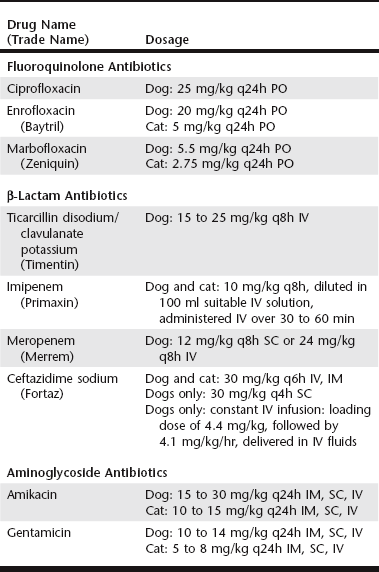Chapter 111 Probably the most challenging bacterial otic infections are those associated with P. aeruginosa (Table 111-1). Although there is insufficient evidence for the use of systemic antimicrobial agents for the treatment of Pseudomonas otitis, the cause is mainly the lack of published reports of randomized controlled studies in the veterinary literature evaluating systemic treatments in this setting. At the present time the fluoroquinolones are the only oral systemic antibiotic available for the treatment of P. aeruginosa infection. Most veterinary dermatologists recommend starting treatment with an oral fluoroquinolone while the C/S results are awaited. When the fluoroquinolones are used in dogs, a dosage at the upper end of the dosage range should be administered. Blindness caused by retinal degeneration has been reported in rare cases in cats given enrofloxacin; therefore a dosage at the low end of the range for an oral fluoroquinolone should be administered in cats. In one multicenter trial, 54 dogs with Pseudomonas otitis externa were administered marbofloxacin at a dose of 5 mg/kg PO once daily for 21 or 42 days, with an overall improvement in 38 of 54 dogs: 15 were cured and 23 partially improved, whereas 16 did not improve (Carlotti et al, 1998). TABLE 111-1 Systemic Drugs and Suggested Dosages for the Treatment of Pseudomonas aeruginosa Otitis Externa and Otitis Media IM, Intramuscularly; IV, intravenously; PO, orally; SC, subcutaneously.
Systemic Antimicrobials for Otitis
Systemic Treatment of Pseudomonas Otitis

![]()
Stay updated, free articles. Join our Telegram channel

Full access? Get Clinical Tree


